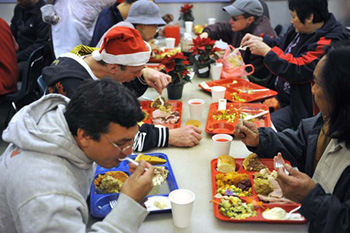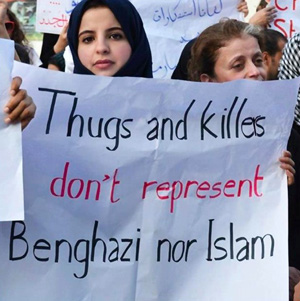Don't Grow Tired Of Doing Good
For Sunday November 17, 2013
Lectionary Readings (Revised Common Lectionary, Year C)
Isaiah 65:17–25 or Malachi 4:1–2a
Isaiah 12 or Psalm 98
2 Thessalonians 3:6–13
Luke 21:5–19
It's been twenty-six weeks of "ordinary time" since the last church feast on Pentecost Sunday — an entire half-year. Next week we celebrate Christ the King on the last Sunday of the liturgical year. The week after that we start all over again with the first Sunday in Advent.
But for this one last week we're still stuck in the uneventful. And right on cue, to keep us going for this long haul of liturgical time, the epistle this week encourages us: "Never tire in doing what is right." (NIV). Or as the NASB translation puts it, "do not grow weary of doing good." (2 Thessalonians 3:13).
Paul himself had founded the church at Thessalonica (see Acts 17:1-8). His ministry there started in the local synagogue, then expanded to include "a large number of God-fearing Greeks and not a few prominent women."
But then detractors claimed that the new believers "defied Caesar's decrees" by saying that "there is another king, one called Jesus." Thessalonica erupted in riots, and the church there faced opposition and persecution. They needed encouragement.
The Thessalonians were also confused about the second coming of Christ. In Paul's first letter to them, they understood him to say that the end of all things was imminent. As a consequence, some people threw in the towel, quit their jobs, and led undisciplined lives.
Paul corrected this misunderstanding in a second letter to them. "No," he said, "don't give up; live life for the long haul. Don't grow tired of doing good."
 |
Feeding the hungry at Glide. |
"Doing good" was part of the paradosis or traditions that Paul passed on to all the churches he visited. In the epistle this week he even uses himself as an example: "When we were with you, we worked night and day, laboring and toiling. We didn't want to burden anyone. So follow our example, don't get discouraged, and keep doing good."
My wife and I recently joined our church youth group on a visit to Glide Memorial United Methodist Church in San Francisco. Founded in 1929 in the Tenderloin district that's best known for adult book stores and strip clubs, Glide stepped into the national limelight in 1963 when it hired the young Afro-American firebrand Cecil Williams as its pastor. 2013 marks Williams's 50th year at Glide.
Glide is many things to many people. But it's especially about doing good. Lots of good, to millions of people who need it most. In the lobby before the service, a Glide volunteer described some of its many ministries.
Upwards of a million free meals a year. A health clinic. Job training. Housing for the homeless. Substance abuse services. A program for "men unlearning violence." Some 50 ministries in all. As we drove home through the city, a long line of people snaked down one block, then turned the corner and continued down another block. They were waiting for their Glide lunch.
Whatever else you might say about Glide, they don't weary in doing good. In that regard they embody the Pauline "tradition."
The same weekend that I visited Glide, I finished a book about ordinary people doing good in difficult circumstances. In Your Fatwa Does Not Belong Here (2013), the Algerian law professor Karima Bennoune of UC Davis collects the untold stories of Muslims who are speaking out against the violence and terror propagated in the name of Islam.
 |
Muslims protest for peace in Libya. |
People often ask, "Why don't Muslims speak out against the violence perpetrated by their religion?" After all, the overwhelming majority of victims of Muslim violence are Muslims. Bennoune's oral history collects the stories of Muslims who are repudiating violence, almost always at great risk to their personal safety. Her book is based upon interviews with 286 Muslims from 26 countries.
There's a liberal mullah in Herat who supports women's rights. School girls performing in an arts festival in Lahore. Artists and journalists of all sorts. A "cultural cafe" in Karachi. School teachers in the West Bank. A cleric resisting the recruitment efforts of Al Shabaab among Somali refugees in Minneapolis.
"Finding a principled position in this political universe," Bennoune admits, "is not easy." Some people work within Islam to reinvigorate its history as a life-affirming religion. Others appeal to universal human rights that transcend all religions. They often find themselves stuck between two bad alternatives — secular autocracy with dictator-thugs like Mubarak, and political theocracy with violent extremists like the Taliban.
These brave Muslims have resisted the temptation to give up. They have not stopped doing and speaking good.
Paul's words to the Thessalonians remind me of a benediction that our priest often uses to end our church service. I think of it as an expanded version of Paul's admonition to never tire of doing good.
"Go forth into the world in peace. Be of good courage. Hold fast to that which is good. Render to no one evil for evil. Strengthen the fainthearted. Support the weak. Comfort the afflicted. Be patient with all but make no peace with oppression. Love and serve the Lord, rejoicing in the power of the Holy Spirit. And the blessing of God Almighty, the Father, the Son, and the Holy Spirit be among you and remain with you always."
Image credits: (1) San Francisco Examiner and (2) +972 Magazine.





